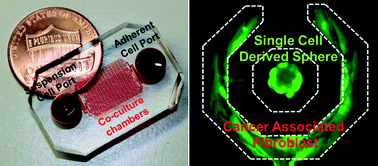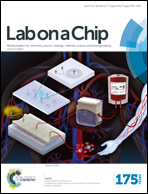Single cell dual adherent-suspension co-culture micro-environment for studying tumor–stromal interactions with functionally selected cancer stem-like cells†
Abstract
Considerable evidence suggests that cancer stem-like cells (CSCs) are critical in tumor pathogenesis, but their rarity and transience has led to much controversy about their exact nature. Although CSCs can be functionally identified using dish-based tumorsphere assays, it is difficult to handle and monitor single cells in dish-based approaches; single cell-based microfluidic approaches offer better control and reliable single cell derived sphere formation. However, like normal stem cells, CSCs are heavily regulated by their microenvironment, requiring tumor–stromal interactions for tumorigenic and proliferative behaviors. To enable single cell derived tumorsphere formation within a stromal microenvironment, we present a dual adherent/suspension co-culture device, which combines a suspension environment for single-cell tumorsphere assays and an adherent environment for co-culturing stromal cells in close proximity by selectively patterning polyHEMA in indented microwells. By minimizing dead volume and improving cell capture efficiency, the presented platform allows for the use of small numbers of cells (<100 cells). As a proof of concept, we co-cultured single T47D (breast cancer) cells and primary cancer associated fibroblasts (CAF) on-chip for 14 days to monitor sphere formation and growth. Compared to mono-culture, co-cultured T47D have higher tumorigenic potential (sphere formation rate) and proliferation rates (larger sphere size). Furthermore, 96-multiplexed single-cell transcriptome analyses were performed to compare the gene expression of co-cultured and mono-cultured T47D cells. Phenotypic changes observed in co-culture correlated with expression changes in genes associated with proliferation, apoptotic suppression, tumorigenicity and even epithelial-to-mesechymal transition. Combining the presented platform with single cell transcriptome analysis, we successfully identified functional CSCs and investigated the phenotypic and transcriptome effects induced by tumor–stromal interactions.


 Please wait while we load your content...
Please wait while we load your content...